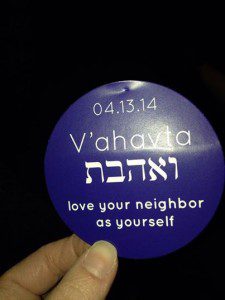This morning, I went to an interfaith Service of Unity and Hope at the Jewish Community Center in Overland Park. Last Sunday, 2 people were murdered there. Another victim was shot at a nearby retirement facility, also connected to the Jewish community.
The man responsible for these heinous acts of violence—we won’t say his name, because I don’t believe in making celebrities out of killers—he had a history. Some long and awful history. He was involved with the KKK, and was even a Grand Dragon, or whatever they call the guys who are the boss of them. He’s been connected with multiple hate groups throughout his life, and has trolled websites that defame Jews, homosexuals, and people of color, to name a few (million people he hated).
And yet: the people he killed were Christians. And white. And heterosexual.
In case I need to say this out loud—I hope I don’t, but I’m not taking chances with something this important—for me, and for people who share my beliefs, a life is a life. And murder is murder. That these victims were Christian does not make it any more or less tragic than if they’d been Jewish, Muslim or atheist.
But for the man who executed these innocent people, there was a big difference—the difference in life and death, in fact—between Jews and not Jews. Between white and not white. Between himself and the great chasm of ‘otherness’ through which he perceived the rest of the world.
Yes, life is life, and murder is murder. But, as it turns out, hate is hate. This man spent his life in the depths of that soul crushing hate. Until finally, finally, he could contain it no more. It became a living, moving thing, with hands and a mind of its own. And that hate, embodied–it didn’t end in the death of the ‘others’ he’d so long feared and persecuted. Ultimately, he killed people who were just like him. At least, in all the ways that he thought were important.
As it turns out, hate that strong does not discriminate. It turns inward. And on the day of reckoning, it does not care who it destroys.
I’m taking the weight of that truth with me to the communion table tonight. As we immerse ourselves in the story—the fateful last meal with the disciples, and the moments leading up to Jesus’ betrayal and arrest—we must each make that inward journey. We’re called to examine all that is unloving and unlovely; the stirrings of anger, resentment, selfishness and entitlement that, untended, can so easily evolve into destructive forces. We acknowledge that, somewhere deep down, we are all capable of evil. Through acts of fear and cowardice, by sins of omission, and in our constant turning away from those in need… we have all done our part to say, ‘who, that guy? I’ve never seen him before in my life. Take him away.’
Lord, in your mercy…
The elements will taste bitter tonight. Knowing that the dust of my own spiteful self has made the bread go stale; that the heat of my old aches and resentments has turned that sweet wine sour.
Lord, hear our prayer…
What can we do, but break it open, and hope against hope that some light will get through the cracks?
Father, forgive us…
What can we do, but pour it out…and hope that Jesus has one more wine glass miracle left to show us?
Mother, do not forsake us…
What can we do, but show up again around this table…and hope that the grace of God reflected in each face at the table will somehow make its way into our winter-frozen hearts?
Because that’s how grace works… It shows up in the most inconvenient places. Not in our own doing, or brilliant words, or redemptive imaginings… but in those other people who show up with us in dimly lit places.
In the end, it is grace that separated 3 beautiful, lost lives from the one tortured soul that ended them… Even though, on the outside–in all the surface things that matter to a hateful world– they looked just the same. The 3 who journeyed on, by all accounts, were outward-looking people. Dr. William Corporon; his grandson, Reat Underwood; Terri LaManno; according to those who bore witness today, their lives were about healing; creativity; community; adventure and discovery; kindness and service and song.
In these ways, maybe they were quite ‘other,’ after all.
So we will be about these things, too. We will stay and name the darkness tonight, and then we will go on. We’ll visit with death tomorrow, and then we will go on. We’ll see what hate and fear and suffering can teach us about our own frightful insides… and then we’ll see if this beloved, rejected other, so often denied, might meet us at the table again, and point us toward the good news sitting next to us. Embodied, beloved, and as wholly othered as we.













